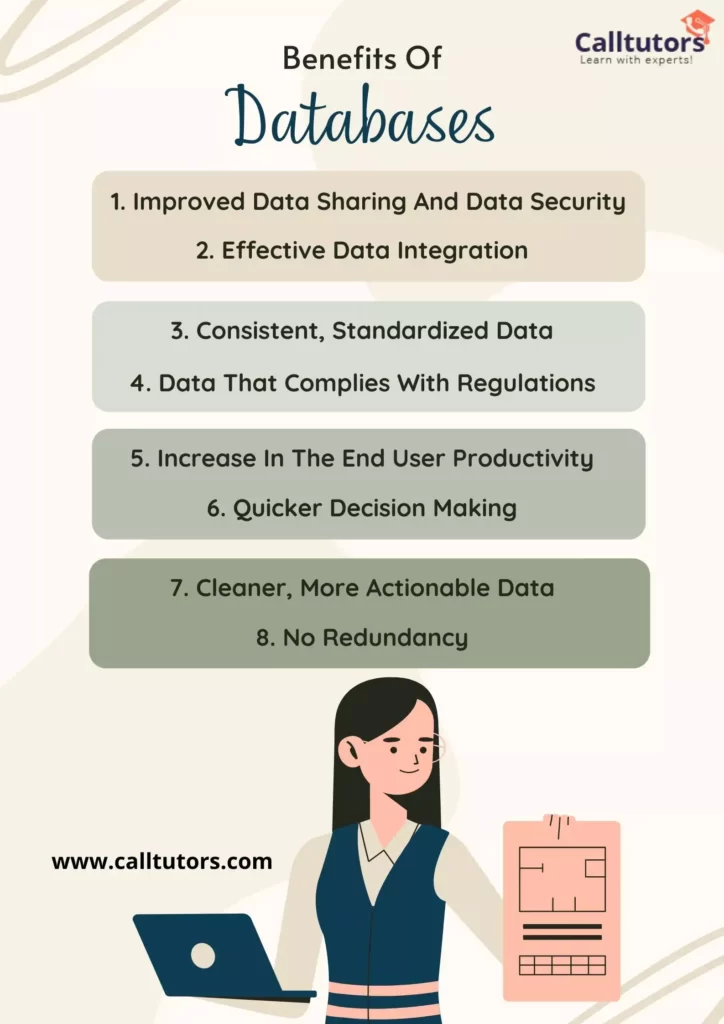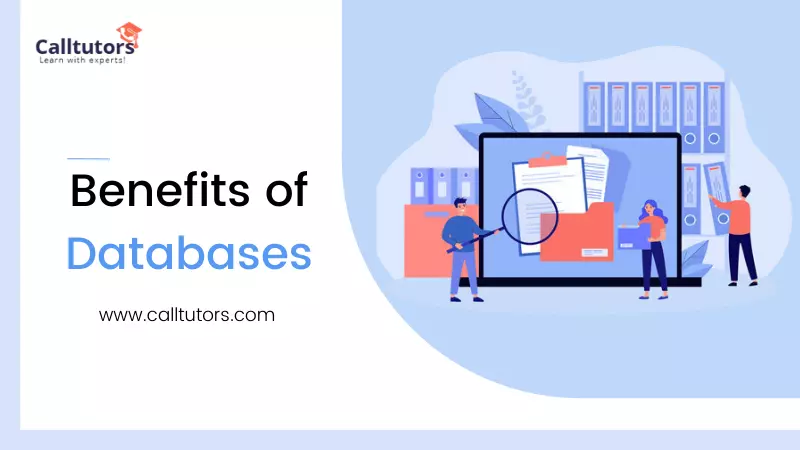At present, the Database has become popular among students. The majority of the people still wondered why Database is so popular and the Benefits Of Databases. If you are also confused about these types of questions, then don’t worry. In this blog, we will discuss everything about Databases, including the Benefits Of Databases, in detail.
What Is a Database?
Table of Contents
A database is an organized collection of information or data that is structured and stored in a computer system electronically. A database management system has generally controlled the database. The data, the DBMS, and the applications that go with them are referred to as a database system, commonly abbreviated as just a database.
The data in the most common types of databases in operation is often described in rows and columns in the table sequence to make efficient data querying and processing. Data may then be accessed, managed, updated, regulated, and organized with ease. For creating and querying data, most databases employ structured query language.
Database Evolution
In the 1960s, databases have developed dramatically. The first systems to store and alter data were navigational databases, such as the hierarchical and network databases. These early systems were rigid, despite their simplicity. Relational databases gained popularity in the 1980s, followed by object-oriented databases in the 1990s.
NoSQL databases were created more recently in response to the rapid expansion of the internet and the demand for quicker processing of unstructured data. And regarding how data is acquired, stored, managed, and used, cloud databases and self-driving databases are breaking new ground today.
Benefits Of Databases | Advantages Of Databases
There are so many benefits of databases and some of them which are important ones are the following:

1. Improved Data Sharing and Data Security
Effective database management systems improve the accessibility of the organization, allowing end-users to share data more rapidly and efficiently across the organization.
A management system helps for getting the solutions quicker of the queries of the database, thus making for faster and more accurate data access. And the end-users such as salespeople will have more data access, allowing for a speedier sales cycle and more informed decision-making.
2. Effective Data Integration
The use of a data management system develops an integrated view of an organization’s activities. It becomes simple to examine how data activities in one silo influence the rest of your database, allowing you to get advanced insight into your tech stack’s linked systems. It is one of the best benefits of databases.
3. Consistent, Standardized Data
When various versions of the same data exist in different areas within an organization, data inconsistencies develop. Irregular procedures and segregated data are responsible for this. You may ensure that an all-encompassing, single, unified view of your data is provided throughout your business by using the right management system and data quality management tools.
4. Data That Complies with Regulations
For enforcing data privacy and security standards, the database management systems offer a more helpful framework. Better management implies more openness and a lower danger of violating rules. Honoring email opt-outs becomes considerably easier with a framework in place to regulate personal profiles and information within a database.
5. Increase In The End User Productivity
Any business that implements a database management system will see an increase in user productivity. End users are empowered by data management systems to make timely and informed decisions that can contribute to an organization’s long-term success or failure.
6. Quicker Decision Making
Data management systems and procedures that are well-designed will produce higher-quality data. As a result, your team will be able to make better, faster decisions in their day-to-day operations.
7. Cleaner, More Actionable Data
Database management systems make your data quality initiatives more adaptable and ultimately successful. These systems aid in the facilitation of data quality activities such as data cleansing, validation, enrichment, and protection.
8. No Redundancy
It is one of the important benefits of databases. By eliminating the redundancy a database management system prevents the duplication of data, saves the storage space, and speeds up the time of access. DBMS offers centralized storage of all data, allowing for more efficient storage space, rather to have several copies of the same data for each firm employee.
Disadvantages Of Databases
There are some disadvantages of databases which are shown below:
- Database systems are tough, time-consuming, and sophisticated to develop.
- Start-up expenses for hardware and software are substantial.
- Virtually all application programs are affected by database damage.
- Conversion expenses are high when shifting from a file-based to a database-based system.
- All programmers and users must undergo initial training.
Role Of Data In Your Business
A sophisticated relational database management system can let you store a large quantity of data that can become increasingly helpful and valuable as it accumulates over time. For example:
- Business patterns can be revealed using historical data.
- Sales records can help you find out who your most valuable customers are.
Furthermore, the disciplines that are necessary to collect, input, and analyze such data may ensure that your company operates in a controlled and well-managed manner.
You should strive to acquire as much data as possible (keeping in mind your data protection duties if you’re gathering personal data) because what information is potentially beneficial is not always clear.
Types Of Databases
There are so many types of databases and some of them are shown below:
| Object-oriented Databases | Objects are used to represent data in an object-oriented database, just as they are in object-oriented programming. |
| Cloud Databases | A cloud database is an organized or unstructured collection of data stored on a private, public, or hybrid cloud computing platform. |
| Relational Databases | A relational database’s items are structured into tables with columns and rows. The most effective and versatile approach to retrieving structured data is through relational database technology. |
| Distributed Databases | A distributed database is made up of two or more files that are stored at various locations. The database might be spread over numerous machines in the same physical area or across multiple networks. |
| Graph Databases | A graph database holds information in the form of entities and their relationships. |
| Multimodel Databases | Multimodel databases merge many database models into a unified, integrated back end. As a result, they can handle a wide range of data. |
| Data Warehouses | A data warehouse is a type of database that is especially intended for quick query and analysis. It is a central repository for data. |
| Open Source Databases | An open-source database system is one whose source code is available to the public; these databases might be SQL or NoSQL. |
| NoSQL Databases | NoSQL databases are nonrelational databases, and it stores the data in the non-tabular form. |
| OLTP Databases | An OLTP database is a fast, analytical database that is built to handle huge quantities of transactions from various users. |
How Is a Database Different From a Spreadsheet?
Both databases and spreadsheets may help you stay organized. A database can take your organization to the next level. A spreadsheet is a document in which you update the data you want to include in it manually. It’s usually kept on a drive that only selected employees can access, often when they’re in the office. Because it’s a document, getting the information you need in a logical way may be difficult.
You have a central location with a database that all employees can simply access, and it doesn’t matter where they are. Employee information, sales contacts, marketing contacts, and client leads are among the items in the database that are kept up-to-date for your organization. A database helps you to arrange this data in a number of ways so you can see how productive different parts of your business are, what brings in consumers, and where there’s space for expansion.
When your organization is tiny, and just a few individuals have access to it, a spreadsheet is the easiest way to manage it. As your firm expands and you need to manage more information and people, you’ll discover that the benefits of a database management system, or DBMS, significantly surpass those of a spreadsheet.
Conclusion
In this blog, we have discussed the Benefits Of Databases. And we hope that the information regarding the Benefits Of Databases which we provide you in this blog is helpful to you. If in any case, you need Database Assignment Help or DBMS Assignment Help you can discuss your requirements with our experts anytime. We are available 24/7 to help you if you have any problems regarding the benefits of databases.
FAQs Related To Benefits Of Databases
Why are databases useful to researchers?
These databases feature scholarly and peer-reviewed articles that are written by reputable individuals such as researchers, journalists, and industry professionals. Users can locate the information they need more quickly because databases give strong search capabilities for refining results.
How databases are helpful in education?
Teachers can create an effective academic year schedule using a database management system. The automatic schedule is error-free and guarantees that no lessons are scheduled at the same time. It also guarantees that all school resources are utilized effectively, such as computer laboratories, classrooms, and libraries.




